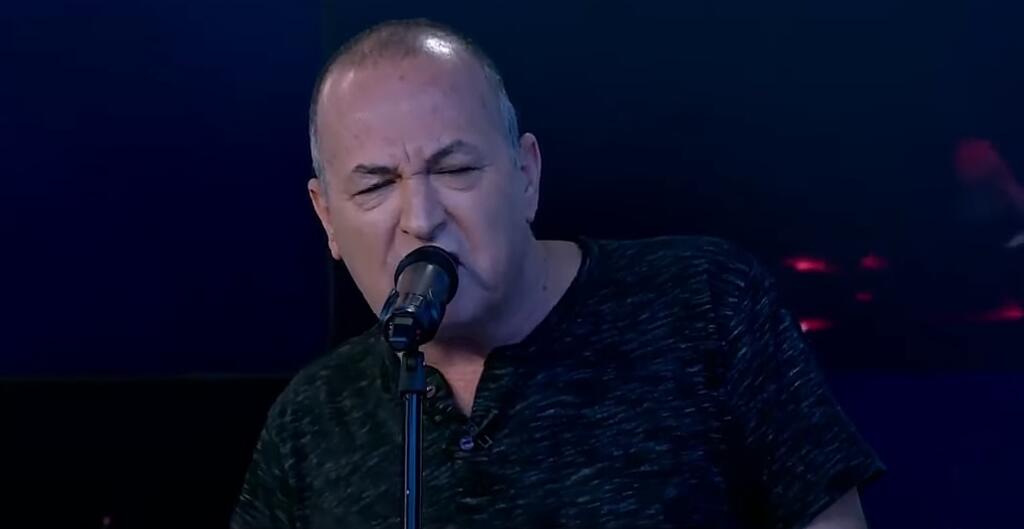Getting your Trinity Audio player ready...
Alex Topel, the charismatic frontman and mastermind of rock icons Yetziat Herum (Emergency Exit), has experienced a wealth of ups and downs throughout his illustrious music career, spanning over four decades.
Read more:
Despite minimal support from the media, Topel has been able to build a devoted fanbase through the emotive power of his lyrics and driving melodies.
After the release of his latest single, Goof Shematzdik Hataim (A Body that Justifies Sins) off of the band's upcoming fifth album, Topel sat down with Ynet for a candid interview about his experiences as an artist and the state of rock and roll.
Let's talk a bit about the new song, Goof Shematzdik Hataim.
“It's a sweeter song than the usual stuff I do. The writing process was easy and pleasant, you can say that it literally came to me in a dream.”
Your music is a powerful blend of energy and passion. What’s your approach to the writing process? Do you have a specific routine where you sit down to write or is it more spontaneous?
"I don't have a set plan; sometimes the songs come to me easily and quickly, like I'm dreaming them. Other times, the process takes several months and needs to be fleshed out. Typically, the melody comes to me quickly and the lyrics, it’s a longer process," he says.
And what inspires you when you create your music?
"I try to incorporate life in general into my art, approaching it from a different angle each time since there is no single issue. The challenges are multifaceted, and everything can't be either entirely optimistic or entirely pessimistic; there has to be a middle ground. Not only seriousness, but also lightness, as well as depth and shallowness. Some sort of a middle ground. Bring out all the different angles as much as possible."
Yetziat Herum first started in 1997 when Topel joined forces with his friend Yosi Brosh and keyboardist Adi Hayat. The trio hit their stride after fruitful writing sessions that resulted in a three-song mixtape.
The band released its self-titled debut album a few months later to little media fanfare. Due to their relative lack of success, each band member went their separate ways over the years.
However, Yetziat Herum returned to the stage about a decade later after gaining popularity among Israeli backpackers abroad. Many of these backpackers were young Israelis going on their big post-military service adventure who were captivated by songs like Nehederet (Wonderful) and Kchi Lach Zman (Take Your Time) while traveling through the Far East and South America.
How do you convey the energy in your music during live performances, and what are the biggest challenges you face in doing so?
"Luckily for me, the audience at my shows is typically knowledgeable about the lyrics, and I don't have to rely on any particular hit. However, there is an issue with the newer generation, some form of attention deficit that I have been noticing for the past few years. The increased use of digital devices, cellphones. In the past, I used to see many young people at my shows, but today, they seem to prefer lighter messages."
Do you feel like your music no longer has the same impact it had before?
"No. It's like we've lost them. When you share something meaningful with them and they give you this blank stare, maybe it’s my own pessimism, but this is what I see. This is a trend I've noticed also in pop culture. Personally, art has always helped me rise up and grow. Life is full of problems and crises, and it's important to discuss them. I believe art should engage in these conversations. How much can be said about happiness? ‘I'm fine’ and that’s about it," he says.
"In my opinion, both rock and roll and art have a crucial role in society, but unfortunately, there seems to be a lack of it. However, some people do appreciate these types of songs and recognize their importance in highlighting issues such as Alefi Yeladim Mookim (Thousands of Beaten Children) or Haprakhim Babursa (The Flowers in the Stock Exchange) which talks about prostitution. Sometimes, art has to be a fist, not just a caressing hand. Songs can’t just be easy and accessible like instant noodles."
What kind of impact do you think your music has left?
“The first disc came out and nothing happened. However, during this time, I, in my loneliness, continued working on the second disc. At some point, I learned that the music was resonating with people on the streets, and I started to perform for live audiences without any radio play or recognition from the media. The music just worked in the streets. Without any support from the media and even before everything went digital. We still had cassettes if you remember,” he laughs.
“You know, seven years after the first CD came out, I started playing live shows and discovered an audience that I wasn't previously aware of. It's a process of constantly performing and creating, all while staying true to ourselves."
What do you think the future holds for music?
"I'm concerned about the state of rock and roll. I can’t believe I'm saying this. I used to think that... not that it would go away or anything, but all this shallowness, simplistic messages and short songs. For instance, on TikTok, clips are only 15 or 20 seconds long.
If John Lennon released a single today, would it be well-received? How can you appreciate Pink Floyd in just 20 seconds? It's something that gets lost, the depth. Isn’t it a shame to lose this pleasure that gave us so much?”


